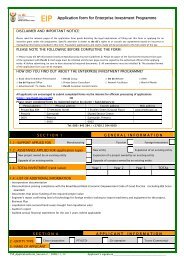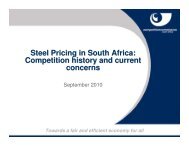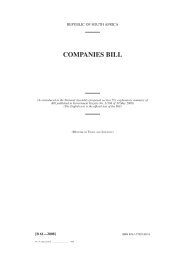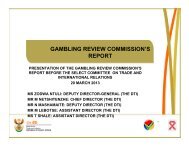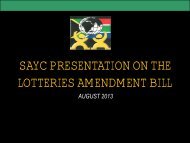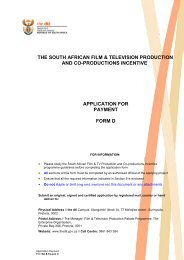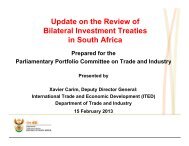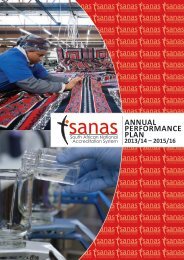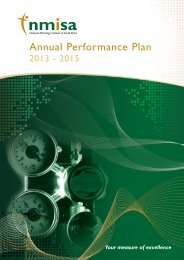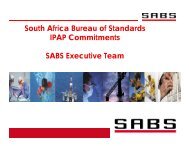1.1.3. LIST OF ENTITIES VISITED AND THEIR RELEVANCE TO THE PROJECT INTERVIEWSThree entities were selected for benchmarking in May 2011:1. The Intellectual Property Office in the Ministry of Culture (ECAD);2. The Central Office for Collections <strong>and</strong> Distributions; <strong>and</strong>3. A director of one of the Collective Management Associations.The interview on ECAD was conducted at the offices of this organisation in Rio de Janeiro with the Superintendent, Ms GloriaBraga. The second interview was conducted with Mr Gustav Gonsalez from ABRAMUS at its premises in Rio de Janeiro. Athird interview was done with the Director of Intellectual Property at her office located in the Ministry of Culture, in Brasilia.Further details were acquired from the Internet <strong>and</strong> other relevant sources. Due to lack of sufficient time, interviews with arecord company, Prof. Paranagua <strong>and</strong> two artists had to be cancelled.1.2. SUMMARIES OF KEY LEGISLATION FOR COPYRIGHT AND COLLECTING SOCIETIESAccording to Brazil’s <strong>Copyright</strong> <strong>Law</strong> 9610, the protection of an intellectual work includes its title, if original <strong>and</strong> unmistakable,in the same genre, from that of another author. Exceptions are the following:(i) The ideas, normative procedures, systems, methods, project or mathematics;(ii) Schemes or rules for carrying out mental acts, games or business;(iii) Blank forms to be filled out with any type of information, scientific or not <strong>and</strong> their instructions;(iv) Texts of agreements or treaties, laws, decrees, regulations, legal decisions <strong>and</strong> other official acts;(v) Information of everyday use such as calendars, diaries, reference files or sub-titles;(vi) Names <strong>and</strong> titles; <strong>and</strong>(vii) Industrial or commercial utilisation of ideas contained in the works.The legislation makes provision for the protection of related or neighbouring rights, including interpretation <strong>and</strong> artisticperformance (including musical); radio broadcasts; phonographic rights (i.e. the fixation of sounds of a performance orinterpretation); or the representation of sounds, which is not a fixation, included in an audio-visual work.The author is regarded as the individual who creates literary, artistic or scientific work, but the protection given to the authormay be given to legal entities in the cases foreseen in <strong>Law</strong> 9610. The patrimonial rights can be owned by companies, but themoral rights of the author are inalienable. Record producers <strong>and</strong> radio stations can be the original copyright owners. Withregard to music, the owners of the author’s rights <strong>and</strong> related rights are:(i) The composer <strong>and</strong> the lyricist, who usually pass the administration of their rights to a music publisher;(ii) The arranger, whose rights are usually passed to the record company; <strong>and</strong>(iii) The interpreter, whose rights usually belong to the record company.In terms of the use of intellectual works, Article 29 of <strong>Law</strong> 9610/98 establishes that prior authorisation of the author (oranyone controlling his rights) is needed for the usage of an intellectual work in terms of:(i) Its partial or total reproduction;(ii) The edition;(iii) Adaptation, the musical arrangement <strong>and</strong> any other transformation or translation to any other language;- 120 -
(iv) The inclusion in a phonogram or any audio-visual production;(v) The distribution, when not inherent to the contract signed by the author with third parties for the use <strong>and</strong> exploration ofthe work;(vi) The distribution of works or productions by means of cable, optical fibre, satellite, waves or any other system that allowsthe user to make the selection of the work or production to receive it at a time <strong>and</strong> place previously determined by theperson who formulates the dem<strong>and</strong>, <strong>and</strong> in cases where the access to the works or production is done by any systemthat means payment done by the user;(vii) The direct or indirect use of the literary, artistic or scientific work, by means of:a) representation, recitation or declamation;b) musical execution;c) use of loudspeakers or similar systems;d) radio or broadcasting;e) reception of transmission of radio broadcasting in places of collective attendance;f) background music;g) audio-visual, cinematographic display or by any similar process;h) use of artificial satellites;i) use of optical systems, telephone wires or not, cables of any kind <strong>and</strong> similar means of communication that may beadopted; <strong>and</strong>j) exhibition of works of art;(viii) The inclusion of the work in a database, the storage in computer, microfilming <strong>and</strong> other forms of filing; <strong>and</strong>(ix) Any other existing forms of use or that may be invented.The law, in Article 97, stipulates that associations should be non-profit, prohibits membership in more than one association,<strong>and</strong> allow members to change between associations, subject to prior written notification to the original association. Article 28stipulates that members m<strong>and</strong>ate the association to perform all acts (judicial or extra-judicial) in defence of their copyright<strong>and</strong> for the collection of their royalties. It further states that owners of copyright can act in their own defence <strong>and</strong> protection ofcopyright, subject to prior notification to the association. Rights are, therefore, not assigned <strong>and</strong> if members move to anotherassociation, their rights move with them. This provision allows for competition between associations for membership <strong>and</strong>provides an incentive for associations to improve their services.Article 99 stipulates that the central office for collections should be non-profit <strong>and</strong> directed <strong>and</strong> managed by the associations.At present, government has no power to intervene in cases where an association functions ineffectively or engages infraudulent activities.1.3. THE EFFECTIVENESS OF THE RELEVANT LEGISLATIONThe proponents of copyright, including ECAD <strong>and</strong> all the associations, believe that the law is effective, particularly the lack ofgovernment regulation <strong>and</strong> intervention, thereby optimising free enterprise <strong>and</strong> good, efficient organisational practice.The revenue of ECAD of $374 255 579,82 in 2008, despite the world economic crises, reflected an increase of 12,63%,showing that the implementation of the copyright law has contributed to economic growth <strong>and</strong> the individual income of artists.- 121 -
- Page 2 and 3:
TABLE OF CONTENTSLIST OF ABBREVIATI
- Page 4 and 5:
11.8 RECOMMENDATIONS ..............
- Page 6 and 7:
LIST OF TABLESTable 1: Cases of Non
- Page 8 and 9:
NORMOSPsPOSAPPLPPL (India)ProLitter
- Page 10 and 11:
These problems are addressed in the
- Page 12 and 13:
xxi.The report considers developmen
- Page 14 and 15:
1.3.8. Determine whether all money
- Page 16 and 17:
1.4.9. The CRC derived considerable
- Page 18 and 19:
2.3 SUBMISSION BY THE DEPARTMENT OF
- Page 20 and 21:
Aspects of Intellectual Property Ri
- Page 22 and 23:
(1) Subject to the provisions of th
- Page 24 and 25:
Copyright Tribunal or an arbitrator
- Page 26 and 27:
society, the South African Recordin
- Page 28 and 29:
3.2.14. With the liquidation of SAR
- Page 30 and 31:
the final rate or rates to be appli
- Page 32 and 33:
(a)that payment is to be made to th
- Page 34 and 35:
information as to their use to enab
- Page 36 and 37:
The WCT and WPPT oblige members to
- Page 38 and 39:
Once the handset technology changed
- Page 40 and 41:
4.3.16. In 2009, in what was coined
- Page 42 and 43:
4.4.6. In exchange for the above li
- Page 44 and 45:
operators are licensed by NORM to p
- Page 46 and 47:
5.2 FUNCTIONING OF COLLECTING SOCIE
- Page 48 and 49:
the grant of licences. Article 17 o
- Page 50 and 51:
6.1.3. The CRC’s assessment of th
- Page 52 and 53:
6.3.3. SAMPRA should be given one y
- Page 54 and 55:
Corporate Governance GapsKing II Re
- Page 56 and 57:
King IIIPrincipleKing IIIRequiremen
- Page 58 and 59:
King IIIPrincipleKing IIIRequiremen
- Page 60 and 61:
8 COLLECTION OF MUSIC ROYALTIES8.1
- Page 62 and 63:
8.1.4.2. Needletime royalties are n
- Page 64 and 65:
8.1.7.4. For the past five years, V
- Page 66 and 67:
PRS (UK)SPRE (FRANCE)SUISA(SWITZERL
- Page 68 and 69:
DetailsPerformance RightsSound Reco
- Page 70 and 71:
8.2.7 Comparative Study Performed b
- Page 72 and 73:
y a collecting society. A rights ho
- Page 74 and 75:
agency, its rights being derived fr
- Page 76 and 77: Mr Robinson said DALRO assumed the
- Page 78 and 79: 10.1.6. The distribution to publish
- Page 80 and 81: 10.4.4. Most of the other collectin
- Page 82 and 83: 10.6.3.4. South African English-lis
- Page 84 and 85: 10.10 CONTRACTUAL RELATIONSHIPS BET
- Page 86 and 87: 10.12.2. The Regulations should rec
- Page 88 and 89: licence that the licensee comply wi
- Page 90 and 91: 11.4.6. The details of ICASA’s ta
- Page 92 and 93: RecommendationsTimelines for Recomm
- Page 94 and 95: enterprises. There was a suggestion
- Page 96 and 97: Copyright as it relates to copyrigh
- Page 98 and 99: 13.4 DEPARTMENT OF ARTS AND CULTURE
- Page 100 and 101: Table 28: Comparative Study’s Key
- Page 102 and 103: KEY ITEMS BRAZIL FRANCE INDIA NORWA
- Page 104 and 105: KEY ITEMS BRAZIL FRANCE INDIA NORWA
- Page 106 and 107: about 30%, which is the highest amo
- Page 108 and 109: 15.1.3. The Copyright Tribunal’s
- Page 110 and 111: 15.1.20. Local music content requir
- Page 112 and 113: for the selected artists. The outco
- Page 114 and 115: King III Report by Institute of Dir
- Page 116 and 117: Paranagua Pedro, “Strategies to I
- Page 118 and 119: Copyright Amendment Act of 1984Copy
- Page 120 and 121: APPENDIX 1(B): SUMMARY OF ORAL REPR
- Page 122 and 123: Due to the fact that the existing c
- Page 124 and 125: Mr BrottelProtection of copyright m
- Page 128 and 129: In the 2009 Annual Report of ABRAMU
- Page 130 and 131: The implementation of this law led
- Page 132 and 133: ecordings. In respect of audio-visu
- Page 134 and 135: In 1995, ECAD distributed 72% of it
- Page 136 and 137: niches in the market to ensure fair
- Page 138 and 139: Proprietary rights allow authors to
- Page 140 and 141: International royalty distribution
- Page 142 and 143: 3.2. Relevant LegislationsThe prese
- Page 144 and 145: IPRS uses the standard tariffs in r
- Page 146 and 147: Ad-hoc workshops on copyright are c
- Page 148 and 149: meaningful living out of their crea
- Page 150 and 151: 4.1.3. LICENSING AND LEGAL REGIMESI
- Page 152 and 153: Ballet teachers; Teachers in the fi
- Page 154 and 155: It was founded in 1928 by the Norwe
- Page 156 and 157: 6.2. STRUCTURE OF COLLECTING SOCIET
- Page 158 and 159: 6.5. COLLECTION OF MUSIC ROYALTIEST
- Page 160 and 161: 1957, when the Managing Director of
- Page 162 and 163: 16.4.14 SWISSPERFORM: CHF4 millionI
- Page 164 and 165: Cross-border licensing of digital r
- Page 166 and 167: algorithm could be used to determin
- Page 168 and 169: Collecting societies in the UK all
- Page 170 and 171: APPENDIX 3: RECOMMENDATIONS BY MITT
- Page 172 and 173: 1.PREAMBLEThe Music Industry Task T
- Page 174 and 175: The environment in which the music
- Page 176 and 177:
3.1.3 IMPLEMENTATION AND ACCESSION
- Page 178 and 179:
In this regard, the Minister should
- Page 180 and 181:
3.5.6 OMBUDSMANThe music industry s
- Page 182 and 183:
RECOMMENDATION 23:The MITT recommen
- Page 184 and 185:
The MITT further recommends that DA
- Page 186 and 187:
APPENDIX 4A: EXTRACTS FROM COPYRIGH
- Page 188 and 189:
(f)(g)doing, in relation to an adap
- Page 190 and 191:
(i)requiring notice of any intended
- Page 192 and 193:
(b)any organization claiming to be
- Page 194 and 195:
PERFORMERS’ PROTECTION ACTNO. 11
- Page 196 and 197:
the parties may agree to refer the
- Page 198 and 199:
- 192 -
- Page 200 and 201:
- 194 -
- Page 202 and 203:
- 196 -
- Page 204 and 205:
- 198 -
- Page 206 and 207:
ANNEXURE 5: COPY OF SARRAL’S CONT
- Page 208 and 209:
- 202 -
- Page 210 and 211:
ANNEXURE 6: SARRAL’S AUDIT REPORT
- Page 212 and 213:
- 206 -
- Page 214 and 215:
TERMS OF REFERENCESNO’SREQUIREMEN
- Page 216 and 217:
TERMS OF REFERENCESNO’SREQUIREMEN
- Page 218 and 219:
TERMS OF REFERENCESNO’SREQUIREMEN
- Page 220 and 221:
TERMS OF REFERENCESNO’SREQUIREMEN
- Page 222 and 223:
TERMS OF REFERENCESNO’SREQUIREMEN
- Page 224:
- 218 -



